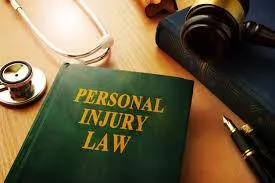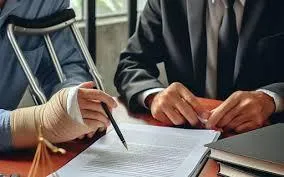Get the Justice You Deserve: Expert Legal Help for Your Personal Injury Case

What should I do immediately after suffering a personal injury in an accident?
Seek Medical Attention: Your health and safety are the top priority. Even if you feel fine, some injuries may not show symptoms right away. Get a medical evaluation to document any potential injuries.
Document the Incident: If possible, gather evidence from the scene of the accident. Take photos or videos of the location, any hazards, property damage, and your injuries. Collect contact information from witnesses and any involved parties.
Report the Accident: Depending on the type of accident, report it to the appropriate authority. For example, if it’s a car accident, call the police to file a report. For a workplace injury, notify your employer.
Avoid Making Statements: Be cautious about discussing the accident with the other party or their insurance company, as your statements could be used against you. Stick to the facts and avoid admitting fault.
Consult a Personal Injury Lawyer: Contact an attorney who specializes in personal injury law as soon as possible. They can guide you through the process, handle negotiations with insurance companies, and help you build a strong case for compensation.
Do I need a lawyer to pursue a personal injury claim?
While it’s not legally required to have a lawyer to pursue a personal injury claim, having one can significantly improve your chances of getting fair compensation. Here are some reasons why hiring a personal injury lawyer is beneficial:
1.Understanding of Legal Procedures:
2.Accurate Valuation of Your Claim:
3.Dealing with Insurance Companies:
4.Building a Strong Case:
5.No Upfront Fees:

How much compensation can I receive for a personal injury claim?
The amount of compensation you can receive for a personal injury claim depends on several factors, including:
The Severity of Your Injuries: More serious injuries, such as broken bones, traumatic brain injuries, or long-term disabilities, typically result in higher compensation than minor injuries like bruises or sprains.
Medical Expenses: Compensation often covers the cost of medical treatment, including doctor visits, surgeries, medications, rehabilitation, and any future medical care you may need.
Lost Wages: If your injury causes you to miss work, you may be entitled to compensation for lost wages. This can also include loss of earning capacity if the injury affects your ability to work in the future.
Pain and Suffering: Compensation for pain and suffering addresses the physical and emotional distress caused by the injury. This can be subjective, but factors like the duration and intensity of your pain, as well as how it impacts your daily life, are considered.
Do Not Sell My Personal Information
Terms & Conditions | Privacy Policy | Marketing Partners | CCPA | Unsubscribe
Copyright © 2024 Paid for Injury ,
All rights reserved.
Advertising paid for by participating attorneys in a collaborative advertising effort. Full details of attorneys involved in this joint advertising initiative are available at Paidforinjury.com. You have the option to select an attorney by name. paidforinjury.com is not a law firm nor an attorney referral service. The information in this advertisement does not constitute legal advice, nor does it guarantee or predict the outcome of your legal matter. Each case is unique and its outcome will depend on the specific laws, facts, and circumstances involved. Choosing an attorney is a significant decision and should not be made solely based on advertisements. We encourage you to request complimentary details about the qualifications and experience of our attorneys. Our advertisements do not suggest a higher quality of legal services compared to other attorneys and do not imply that the participating attorneys are certified as specialists or experts in any field of law. Legal services will only be provided after a formal agreement is signed between the client and the attorney.

What should I do immediately after suffering a personal injury in an accident?
Seek Medical Attention: Your health and safety are the top priority. Even if you feel fine, some injuries may not show symptoms right away. Get a medical evaluation to document any potential injuries.
Document the Incident: If possible, gather evidence from the scene of the accident. Take photos or videos of the location, any hazards, property damage, and your injuries. Collect contact information from witnesses and any involved parties.
Report the Accident: Depending on the type of accident, report it to the appropriate authority. For example, if it’s a car accident, call the police to file a report. For a workplace injury, notify your employer.
Avoid Making Statements: Be cautious about discussing the accident with the other party or their insurance company, as your statements could be used against you. Stick to the facts and avoid admitting fault.
Consult a Personal Injury Lawyer: Contact an attorney who specializes in personal injury law as soon as possible. They can guide you through the process, handle negotiations with insurance companies, and help you build a strong case for compensation.
Do I need a lawyer to pursue a personal injury claim?
While it’s not legally required to have a lawyer to pursue a personal injury claim, having one can significantly improve your chances of getting fair compensation. Here are some reasons why hiring a personal injury lawyer is beneficial:
1.Understanding of Legal Procedures:
2.Accurate Valuation of Your Claim:
3.Dealing with Insurance Companies:
4.Building a Strong Case:
5.No Upfront Fees:

How much compensation can I receive for a personal injury claim?
The amount of compensation you can receive for a personal injury claim depends on several factors, including:
The Severity of Your Injuries: More serious injuries, such as broken bones, traumatic brain injuries, or long-term disabilities, typically result in higher compensation than minor injuries like bruises or sprains.
Medical Expenses: Compensation often covers the cost of medical treatment, including doctor visits, surgeries, medications, rehabilitation, and any future medical care you may need.
Lost Wages: If your injury causes you to miss work, you may be entitled to compensation for lost wages. This can also include loss of earning capacity if the injury affects your ability to work in the future.
Pain and Suffering: Compensation for pain and suffering addresses the physical and emotional distress caused by the injury. This can be subjective, but factors like the duration and intensity of your pain, as well as how it impacts your daily life, are considered.
Do Not Sell My Personal Information
Terms & Conditions | Privacy Policy | Marketing Partners | CCPA | Unsubscribe
Copyright © 2024 Paid for Injury ,
All rights reserved.
Advertising paid for by participating attorneys in a collaborative advertising effort. Full details of attorneys involved in this joint advertising initiative are available at Paidforinjury.com. You have the option to select an attorney by name. paidforinjury.com is not a law firm nor an attorney referral service. The information in this advertisement does not constitute legal advice, nor does it guarantee or predict the outcome of your legal matter. Each case is unique and its outcome will depend on the specific laws, facts, and circumstances involved. Choosing an attorney is a significant decision and should not be made solely based on advertisements. We encourage you to request complimentary details about the qualifications and experience of our attorneys. Our advertisements do not suggest a higher quality of legal services compared to other attorneys and do not imply that the participating attorneys are certified as specialists or experts in any field of law. Legal services will only be provided after a formal agreement is signed between the client and the attorney.